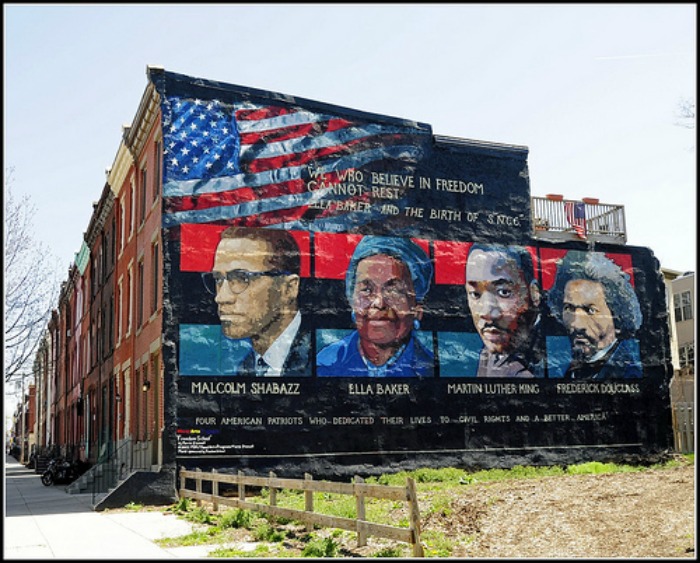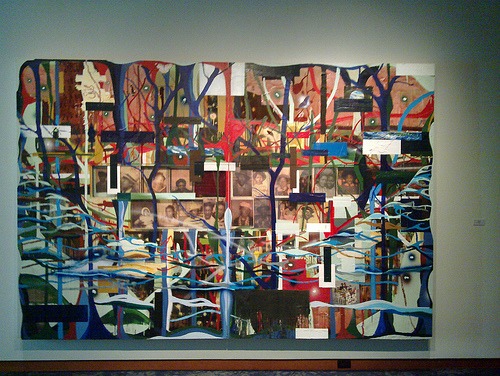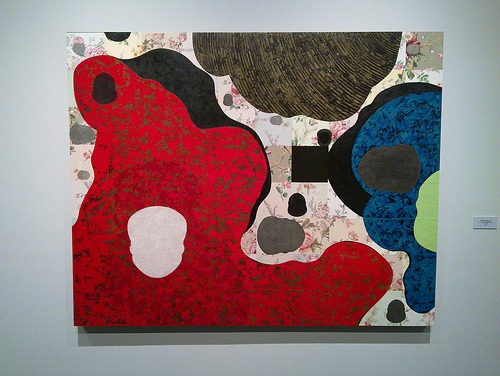Last week, the idea of using Hip Hop music as a way of establishing rapport with urban youth in Music as a Means of Establishing Rapport was discussed. I thought it would be interesting to extend this discussion by looking at ways social workers can include religion and spirituality into the conversation with a client.
To that end, I listened to the podcast Incorporating Religion and Spirituality into Social Work Practice with African Americans by Dr. Jonathan Singer in which he was interviewing Dr. Nancy Boyd-Franklin. Dr. Boyd-Franklin is a multi-cultural researcher, family therapist and clinical trainer.
“We Who Believe in Freedom Cannot Rest”
(Mural on a row of houses in Philadelphia; Artist: Parris Stancell) L to r: Malcolm Shabazz (Malcolm X), Ella Baker, Martin Luther King, Frederick Douglass
Dr. Boyd-Franklin explains how for African American families, some of their biggest strengths are the family itself, the extended family and the church family. While this is not true of every African American, there are many African Americans for whom their beliefs are very strong and can be used to help them overcome adversity, racism, loss, illness, trauma and death.
There is much variability and diversity in the Black community and this holds true with respect to religion and spirituality. For purposes of brevity, the focus was on the traditional African American churches such as Baptists, African American Episcopal and Church of God in Christ.
Religion and spirituality are not perceived as identical concepts. This is because some people may be uninvolved in a church or a religion but see themselves as spiritual or feel spirituality is a part of their life. Religion refers to church involvement while spirituality is a more general concept about a belief in God, or a higher power, or the Creator, as well as a belief in spiritual action in one’s life.
Art work from the Harvey B. Gantt Center for African American Arts + Culture
African Americans often describe their churches as church homes and church families. It is an all-inclusive support network. Aside from the minister, the minister’s wife, the deacons, the deaconesses, the churches provide activities and supports in place for people at every stage of the life cycle.
For example, there is a nursery where parents young parents can take their children and be a part of church services. For older children and youth, the churches typically hold Sunday school and offer all kinds of activities including after school tutoring programs (the safe socialization option used by African American parents for kids in very dangerous urban areas).
Wonderful services are also provided for the elderly. The churches reach out to the folks who are homebound, folks in nursing homes and people in hospitals going through life-threatening diseases. Furthermore, African American churches also act like many social service agencies in terms of providing services for the homeless and foodbanks.
It is important to note that the churches are not only a resource for their church family members but also for African Americans who aren’t members of church families, particularly in terms of services for youth and elderly.
Art work from the Harvey B. Gantt Center for African American Arts + Culture
Dr. Boyd-Franklin recommends that all social workers, psychologists, family therapists and mental health professionals in general take the time to find out what meaning or importance religion and/or spirituality play in the lives of their African American clients during their initial assessments.
This is because for the individuals or families for whom religion or spirituality is important, it tends to be a strength, a survival mechanism central to their resilience. In this manner, mental health professionals will know whether the client’s religion or spirituality can later be suggested as something for the client to draw upon for strength and support in time of need.
In a subsequent post, I will share some of the suggestions Dr. Boyd-Franklin offered on how to talk and raise this topic with African American clients.
In the interim, please share your thoughts and comments about this post. Have you brought up religion and/or spirituality with your clients and if so, how helpful did you find it? Were there any awkward moments?
Photo credit: Tony the Misfit
We Who Believe In Freedom Cannot Rest
Photo credit: Konstantinos Koukopoulos
http://www.flickr.com/photos/kkoukopoulos/4227873361
http://www.flickr.com/photos/kkoukopoulos/4228644818





Differentiating between religion and spirituality is important and people don’t make this distinction enough, so it’s great to see that it was done in this podcast.
Churches and religion can be a rich source of assets for many people, and as Dr. Boyd-Franklin notes, are traditionally a very important asset within African American communities. I think it’s key for social workers and other helping professionals to understand all the ways religion, churches and spirituality can play a role in the lives of African Americans so when one is working with a given individual client one can assess to what degree these resources are part of someone’s life, or might be brought into someone’s life. At the same time, it’s important to realize that there are people within the African American community who will relate to other religious/spiritual traditions or who might be atheists or agnostics. This is the diversity of which Dr. Boyd-Franklin speaks; we have to maintain a balance between being knowledgeable about various cultural, spiritual and religious traditions while not assuming they automatically apply to anyone.
Great job summarizing this important podcast Dorlee!
As always, thanks so much Nancy for sharing your valuable thoughts and feedback.
I totally agree on our need to become familiar with the various cultural and religious traditions while recognizing that many people from a specific culture may choose to behave or believe differently.
By the way, delving into this topic raised for me the following questions which I’ve posed to Dr. Boyd-Franklin:
1) How does she recommend that one answer questions like what is your religion and how religious are you from the client (when your religion/observance level is clearly different)
2) Does the Hispanic population also tend to derive as much strength and resilience (as the African American population) from their religion and spirituality?
3) Does the Hispanic population tend to also have access to church families and church services?
Dear Dorlee,
I think it is important to know what provides strength and hope in a person’s life. Cultural sensitivity and awareness is also crucial.
The impact of Dr. Martin Luther King Jr. is a remarkable example of the intermingling between empowerment, the struggle for human rights and dignity, and the church.
Although not everyone identifies with religion (I am one of those spiritual but not religious people), if someone does it helps to know that and allow space for it in a therapeutic context.
Excellent topic!
Warm regards,
Lauren
Dear Lauren,
As I’m reading your thoughtful response, I’m thinking that for some people, there may also be many non-religious and non-spiritual sources of strength and resilience such as beloved family members, close friends, mentors/teachers, heroes in books and more.
So that this idea of trying to understand what brings hope and strength in a person’s life needs to be extended to all that it means for each person – for some, it may be spiritual and/or religious and for others it be non-spiritual/ religious and for some, it may be a combination.
And I love that fact that you mentioned Dr. Martin Luther King, Jr. – he’s such a wonderful hero for African Americans and a symbol of strength, inspiration, hope, freedom, the church and ultimate empowerment.
Thanks so much for visiting and sharing your valuable input!
Warmly,
Dorlee